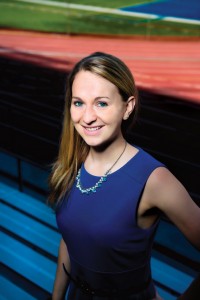Anna Aagenes on Being Out in Sports
Anna Aagenes sat down to talk about her experience being out in sports with G Philly for the new summer issue of the magazine. Here’s what she had to say about changing attitudes, coming out and life lessons learned on the field.
How did you first get involved with sports?
All of my life I have been an athlete – I’ve played field hockey, basketball, soccer, snowboarding, track and everything in between. I began running cross-country and track my junior year of high school. I fell in love with the sport.
What was it like coming out to your teammates?
I date both men and women, but it took me a long time to be comfortable enough to tell people I identify as bisexual. The process of coming out began during middle school when I started to question my sexual orientation. I’m now comfortable identifying, but coming out when I meet new groups of people or join a new team is still an ongoing process. When I started dating my first college girlfriend, I confided in a few teammates and had come out to the rest of my friends and the team only a few months into my freshman year. Of course I was anxious about the decision to come out, but the more people who found out and became my allies, the more confidence I gained.
You’ve been a voice for other LGBT athletes over the years, speaking at colleges and universities. What’s the reaction usually like?
Being a visible LGBT athlete brings up the assumption that you can’t be gay, bisexual, lesbian or transgender and an athlete, at least not openly so. I don’t think I necessarily fit the stereotypes for what an LGBT athlete might look like, so people are often surprised. The whole purpose of the advocacy work is to show that these categories aren’t mutually exclusive – not all athletes should be presumed straight, and not all LGBT people should be assumed to be “non-athletes.”
What are the biggest challenges in coming out in the sports world today?
One of the biggest challenges is that there is a lack of role models that we see in the sports world, a lack of precedent for being openly gay, bisexual or transgender athlete—and being the “first” is very difficult.
Do you expect that attitudes will soon change?
Yes. I think the younger generations have shown that the old notions of sexuality as an “issue” are outdated. Young people especially are disproportionately supportive of the LGBT community, and this will continue to impact the rest of the culture.
How has sports informed your personal life?
Many of my values have been informed by sports and vice versa, most importantly to be a team-oriented individual. I have learned that the darkest and most difficult moments—the moments you are about to give up because it’s “too hard”—are often when you actually break through and achieve something amazing.
How do you stay fit and involved these days?
Though I’m taking a break from professional competitions, I’m sure you’ll see me out there competing in some local Philadelphia events sometime soon. I’m a lifelong athlete, and that’s never going to go away.
Aagenes is a research assistant for HIV clinical trials with adolescents at Children’s Hospital of Philadelphia. Pick up the new issue of the magazine at your favorite LGBT-friendly destination. Or sign up for a free subscription online.



